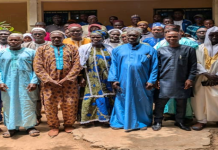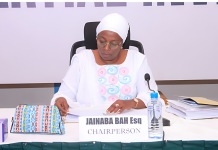By Mustapha Jallow
A total of 77.3 percent of Gambian citizens thinks the National Human Rights Commission (NHRC) is trustworthy. When compared to those that did not experience a Human Rights Violation (HRV) the number rises to 85.9 percent – a difference of 8.6 percent.
The data, contained in a new survey, was released on 21st March 2023, which was conducted in The Gambia by experts from the American Bar Association Rule of Law Initiative (ABAROLI) in collaboration with Freedom House through the funding from Human Rights Support Mechanism (HRSM).
According to the organisers, the study aims to assess the role, processes; and interactions human rights institutions and civil society organizations (CSOs) have on human rights violation claims and complaints as well as to gather insight about trust in National Human Rights Institutions, the state and CSOs for pursuing justice for rights violations.
The current study also looks at the relationship between victims’ trust in NHRI, CSOs and the judicial system. Despite being a state institution, it says almost all the individuals interviewed for this research agreed that the NHRC has been able to maintain its impartiality as a body capable of holding government accountable for human rights violations.
It added that public trust has meant the public engages the NHRC to obtain redress for violations suffered and also report violations witnessed. From the interviews conducted, the public trust in the NHRC is largely due to its mandate, competence and track record of taking a stance on issues even in cases where the government has a vested interest, said the study.
“It is apparent that CSOs one of key roles that they play is to signpost victims to the NHRC to report their cases. In some cases, CSOs also support victims through the process of filing their complaints and making follow ups on their cases,’’ it highlighted.
The study further said: “Almost all the CSOs and victims, when asked about the most prevalent types of human rights violations, highlighted the involvement of state security agents in human rights violations. As part of the country’s transitional justice process, a security sector reform was and is still part of the reform agenda despite limited progress in this area.’’
“The TRRC’s final report and corresponding government whitepaper include a number of recommendations on reforming security, including training security personnel and strengthening the effectiveness and accountability of security institutions. The NHRC as part of its mandate in upholding the rule of law and democratic principles of security institutions can support security institutions by providing legal expertise for the development of legal frameworks, regulations, and policies on accountability mechanisms. Pursuing institutional reforms to ensure that processes are more victim-centric and the availability of redress for victims is key,’’ highlighted the study.






















